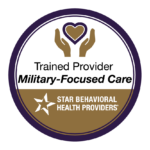Mental Health Support for Multiple Sclerosis
“Start by doing what’s necessary, then do what’s possible; and suddenly you’re doing the impossible.” ~ St. Francis of Assisi
Multiple Sclerosis is different for everyone, but you're not alone.
When someone is newly diagnosed with Multiple Sclerosis (MS), they often experience a whirlwind of emotions and challenges that can feel overwhelming. MS is a chronic, unpredictable condition that affects everyone differently, and those early days after diagnosis often come with intense uncertainty and fear. You don’t have to go it alone though. Mental health care is health care and we’re here for you.
Where to Start with a New Multiple Sclerosis Diagnosis

When you’re first diagnosed with Multiple Sclerosis, you’ll no doubt have a million questions. We’re here to help you sort through the emotional and mental health aspects of your diagnosis.
Here are some practical steps to prioritize your mental health:
- Get organized. Even if being an organized person isn’t your thing, now is the time to fake it until you make it. You’ll want folders for things like:
-
- Doctor appointments
- Health insurance and billing information
- Lab work and test results
- Medication lists
- Treatment records
- Articles and research
- Legal documents
- Important phone numbers/contact information
Set Realistic Goals – Breaking down tasks into manageable steps can help prevent feelings of overwhelm. Keeping a journal or planner specifically for symptoms, goals, and activities can help you to feel a greater sense of control and progress.
Prioritize Rest and Energy Conservation – MS often causes fatigue, so learning to balance activity and rest early on will go a long way. Listen to your body and allow time for rest when you need it, without the burden of feeling guilty. We know that last part can be easier said than done, but practice makes perfect.
Develop a Routine – A structured routine helps create predictability and can make it easier to establish healthy habits around sleep, nutrition, and physical activity.
Seek Social Connection and Support – Joining support groups for people with MS, whether in-person or online, can offer camaraderie and reassurance. Staying connected with loved ones and friends who understand your journey is also invaluable. You may think that no one understands unless they’ve been through it, but your friends and family love you and are here to support you. Let them love you.
Practice Mindfulness and Relaxation Techniques – It sounds simple, but mindfulness and breathing exercises can help you manage stress and anxiety, especially on days when symptoms are more intense.
Focus on Nutrition and Physical Health – Adopting a balanced diet and gentle exercise routine (with your doctor’s approval) can boost energy levels, mood, and general well-being. Of course, we would never discourage the occasional treat, with moderation.
Be Kind to Yourself – You would give this advice to any loved one if the shoe were on the other foot. So, it’s only fair that we remind you of the same. Be compassionate with yourself, especially when you experience setbacks. Practicing self-compassion is particularly important for maintaining a resilient mindset.
- Talk to a therapist when you need to. Talking to a therapist is a great way to find support for your Multiple Sclerosis diagnosis outside of your everyday circle. Keep reading to see how we can help.
Counseling can help.
We understand that an MS diagnosis is a lot. It brings a mix of physical, emotional, and cognitive changes that affect day-to-day life. Counseling offers a safe and supportive space to process these shifts and learn strategies for managing uncertainty, stress, and the impact of symptoms like fatigue, mobility changes, or memory lapses. Our therapists are trained specifically in life transitions counseling and can provide tools for adapting routines, communicating effectively with loved ones, and fostering resilience. Whether navigating new physical limitations or preparing for future adjustments, counseling can help you feel more empowered in your approach and journey with confidence, emotional balance, and a renewed sense of control.
Your Mental Health and Multiple Sclerosis
Receiving a new MS diagnosis can be a stressful and frightening experience, and often it can result in mental health symptoms such as:
Fear of the Unknown – The unpredictable nature of MS can bring anxiety about what symptoms might develop, how quickly the condition will progress, and what the future may hold for you.
Loss of Control and Identity – You might feel a sense of lost independence and control as everyday tasks become more challenging. This can affect how you see yourself and your capabilities.
Isolation and Loneliness – MS can sometimes create a sense of distance between you and your peers or family, especially if symptoms limit your ability to engage in activities you once enjoyed. You may feel misunderstood by those who don’t fully grasp the impact of your condition.
Emotional Roller Coaster – Adjusting to an MS diagnosis may bring intense waves of sadness, frustration, depression, and grief. These feelings can be sudden and powerful, especially as you adapt to new physical limitations or changes in your symptoms.
Many of these symptoms are normal and expected but when they persist for a long period of time or they start to negatively impact daily life. It is important to seek support. That’s what we’re here for.

How We Can Help Support Your Mental Health When You're Newly Diagnosed with Multiple Sclerosis?
Counseling is an important part of dealing with a new Multiple Sclerosis diagnosis. At MUV Counseling we offer a variety of counseling modalities that can support you as you navigate a new MS diagnosis, such as Cognitive Behavioral Therapy (CBT), which focuses on changing unhelpful thoughts and behaviors, Acceptance and Commitment Therapy(ACT) supports value-driven action and Narrative Therapy/Life Story Therapy helps build insight into your story of self and meaning in your life. These three approaches can provide an effective way to process and manage the emotions associated with a new Multiple Sclerosis diagnosis.

Types of Counseling
Cognitive behavioral therapy (CBT) helps you understand and manage the thoughts, emotions, and behaviors linked to your Multiple Sclerosis diagnosis. We’ll work together to develop coping strategies that reduce anxiety and foster resilience.
Acceptance and commitment therapy (ACT) teaches you how to embrace the emotional waves that accompany your diagnosis while focusing on what truly matters in your life. Rather than fighting difficult emotions, we’ll guide you toward living a meaningful life aligned with your values, despite the uncertainty.
Narrative/Life Story Therapy allows you to reclaim your voice and rewrite your MS story on your own terms. By reflecting on your life experiences and reframing your journey, you can find strength in your personal narrative and envision a future shaped by hope.
For more details about therapy for a new Multiple Sclerosis diagnosis in Scottsdale, call us at 480-300-2635 for a free 15 minute consultation or email us with your questions. If you’re ready to get started, schedule online here.



